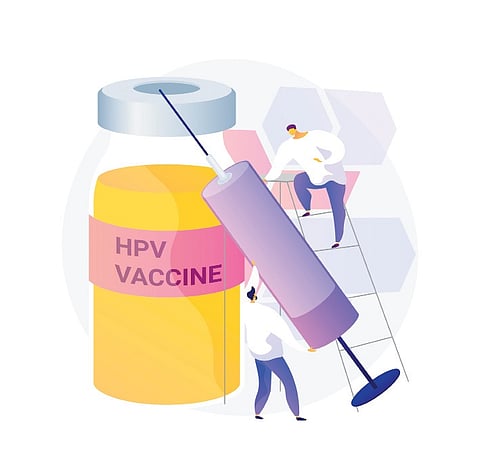

KOCHI: Every year, March 4 is observed as the International HPV Awareness Day to shed light on the human papillomavirus (HPV), its associated health risks, and the need for prevention and vaccination.
HPV, a sexually transmitted infection (STI), permeates through populations globally, affecting nearly all sexually active individuals at some point in their lives. With a vast array of over 200 identified strains, the majority of which pose no immediate health risks, certain high-risk types loom ominously, capable of precipitating various cancers.
The International Papillomavirus Society (IPVS), which spearheads the global awareness campaign, remains steadfast in its mission to empower individuals and communities through the dissemination of knowledge and resources pertaining to HPV and its prevention.
In an era where information is key, such initiatives play a pivotal role in equipping individuals with the necessary tools to combat this silent yet formidable adversary.
Delving deeper into HPV-related diseases, it becomes evident that while many infections may resolve spontaneously, persistent encounters with high-risk HPV strains can unleash a myriad of health complications.
From the insidious onset of cervical cancer, which ranks as the fourth most common cancer among women globally, to the less prevalent yet equally concerning vaginal, vulvar, penile, anal, and select head and neck cancers, the ramifications of HPV infections reverberate through the fabric of society.
Cervical cancer serves as a poignant reminder of the serious nature of HPV infections. With over 99 per cent of cervical cancer cases attributed to HPV infections, the importance of prevention and early detection cannot be overstated. Persistent infection with high-risk HPV variants can set in motion a cascade of precancerous changes within cervical cells, culminating in the dreaded diagnosis of cervical cancer if left unchecked.
Amidst this backdrop of looming health risks, HPV vaccination emerges as a potent weapon in the arsenal against HPV-related illnesses. Representing one of the most impactful public health interventions to date, HPV vaccines target specific high-risk HPV strains associated with most HPV-related cancers.
By stimulating the immune system to generate antibodies tailored to the HPV strains included in the vaccine, these vaccines effectively neutralise the virus before it can infiltrate cells.
The adage, ‘prevention is better than cure’, rings true in the realm of HPV vaccination. The Centers for Disease Control and Prevention (CDC) advocates for HPV vaccination to commence at age 11 or 12, offering a window of opportunity to inoculate against HPV before exposure occurs. The vaccination schedule typically involves two doses of the vaccine administered six to 12 months apart.
However, for individuals aged 15 and older, a three-dose schedule is recommended, with the second dose administered one to two months after the first, and the third dose given six months after the first dose. Furthermore, vaccination is recommended for individuals up to age 26 who haven’t previously received the vaccine, underscoring the importance of early intervention in mitigating HPV-related risks.
Studies show that HPV vaccination can significantly reduce the risk of cervical cancer by up to 90 per cent, while also diminishing the likelihood of vaginal, vulvar, and anal cancers by comparable margins. Moreover, the vaccine has demonstrated efficacy in lowering the incidence of penile cancer by up to 70 per cent, alongside substantial reductions in head and neck cancers attributable to HPV.
In conclusion, while HPV may lurk in the shadows as one of the most prevalent STIs worldwide, it need not instill fear. By embracing a culture of prevention, coupled with regular cervical cancer screening for women, we can collectively endeavour to stem the tide of HPV-related diseases. Let us reaffirm our commitment to raising awareness, promoting prevention, and advocating vaccination in the fight against HPV.
Mind and Body
Got health concerns you want to share with a doctor? Are you looking for credible answers regarding symptoms, medicines or lifestyle disorders? Write to us on cityexpresskoc@newindianexpress.com, and we will get healthcare professionals to answer them.
The writer is a specialist at Malabar Cancer Care Society, Kannur